The Vietnam Veterans of America Foundation (VVAF), established in 1980, now the Veterans for America (VFA), is a Washington, D.C.-based international humanitarian organization that addresses the consequences of war and conflict. The founder of VVAF is Bobby Muller, a former U.S. Marine lieutenant and Vietnam veteran.
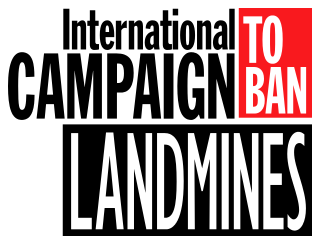
The International Campaign to Ban Landmines (ICBL) is a coalition of non-governmental organizations whose stated objective is a world free of anti-personnel mines and cluster munitions, where mine and cluster munitions survivors see their rights respected and can lead fulfilling lives.

The HALO Trust is a non-political and non-religious registered British charity and American non-profit organization which removes debris left behind by war, in particular land mines. With over 8,000 deminers worldwide, HALO has operations in 28 countries. Its largest operation is in Afghanistan, where the organization continues to operate under the Taliban regime that took power in August 2021.

Unexploded ordnance, unexploded bombs (UXBs), and explosive remnants of war (ERW) are explosive weapons that did not explode when they were employed and still pose a risk of detonation, sometimes many decades after they were used or discarded. UXO does not always originate from wars; areas such as military training grounds can also hold significant numbers, even after the area has been abandoned. UXO from World War I continue to be a hazard, with poisonous gas filled munitions still a problem. When unwanted munitions are found, they are sometimes destroyed in controlled explosions, but accidental detonation of even very old explosives also occurs, sometimes with fatal results.
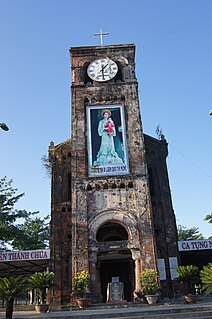
Quảng Trị is a province in the North Central Coast region of Vietnam, north of the former imperial capital of Huế.

Survivor Corps, formerly known as the Landmine Survivors Network, was a global network of survivors helping survivors to recover from war, rebuild their communities, and break cycles of violence. The organization currently operated programs in Albania, Armenia, Azerbaijan, Bosnia-Herzegovina, Burundi, Colombia, Croatia, El Salvador, Ethiopia, Georgia, Jordan, Kosovo, Macedonia, Montenegro, Serbia, Uganda, Rwanda, the United States and Vietnam.
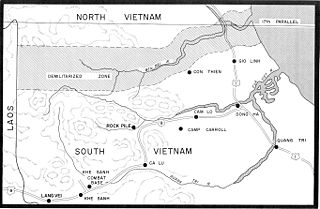
The Vietnamese Demilitarized Zone was a demilitarized zone established as a dividing line between North and South Vietnam from July 1954 to 1976 as a result of the First Indochina War. During the Vietnam War (1955-1975) it became important as the battleground demarcation separating North from South Vietnamese territories. The zone ceased to exist with the reunification of Vietnam on July 2, 1976, though the area remains dangerous due to the numerous undetonated explosives it contains.
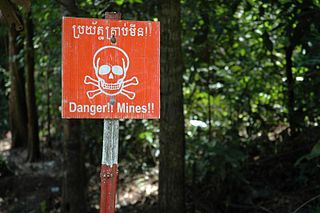
Cambodia is a country located in Southeast Asia that has a major problem with landmines, especially in rural areas. This is the legacy of three decades of war which has taken a severe toll on the Cambodians; it has some 40,000 amputees, which is one of the highest rates in the world. The Cambodian Mine Action Centre (CMAC) estimates that there may be as many as four to six million mines and other pieces of unexploded ordnance in Cambodia. Some estimates however run as high as ten million mines.
A mine clearance organization, or demining organization, is an organization involved in removal of landmines and unexploded ordnance (UXO) for military, humanitarian, or commercial reasons. Demining includes mine clearance, as well as surveying, mapping and marking of hazardous areas.
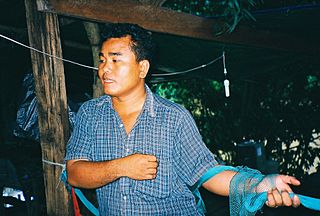
Aki Ra is a former Khmer Rouge conscripted child soldier who works as a deminer and museum curator in Siem Reap, Cambodia. He has devoted his life to removing landmines in Cambodia and to caring for young landmine victims. Aki Ra states that since 1992 he has personally removed and destroyed as many as 50,000 landmines, and is the founder of the Cambodian Landmine Museum.
Land mines in Central America are a by-product of the Cold War-era conflicts of the 1980s. Contrary to the requirements of generally accepted international law, the minefields of Central America were usually unmarked and unrecorded on maps. Once placed, mines remain active for years, waiting the pressure of an unwary foot to detonate.
Mine action is a combination of humanitarian aid and development studies that aims to remove landmines and reduce the social, economic and environmental impact of them and the explosive remnants of war (ERW).

No More Landmines was a United Kingdom-based humanitarian landmine relief charity. The charity focused on landmine and unexploded ordnance removal, mine risk education programmes, and rehabilitation of survivors of landmine injuries. No More Landmines was established in May 2005 as the UK administrator of the United Nations Association Adopt-A-Minefield campaign, which has cleared over 21 million square metres of affected land since 1999. The charity closed in 2015, according to the Charities Commission.

The Mines Advisory Group (MAG) is a non-governmental organization that assists people affected by landmines, unexploded ordnance, and small arms and light weapons.

The Cluster Munitions Ban Advocates are a group of individuals whose lives have been affected by cluster munitions, a particular type of explosive weapon that has been banned for its indiscriminate area effects and risk from unexploded ordnance. They come from Afghanistan, Albania, Cambodia, Croatia, Ethiopia, Iraq, Laos, Lebanon, Tajikistan, Serbia and Vietnam. The Ban Advocates took an active role in the Oslo Process on cluster munitions that led to the Convention on Cluster Munitions, a treaty banning cluster munitions and providing innovative provisions to assist the victims of these weapons. The Ban Advocates initiative was launched in October 2007 by Handicap International Belgium, a founding member of the Nobel Peace Prize-winning International Campaign to Ban Landmines. The Ban Advocates spoke in front of the international community on many occasions. According to the Irish Minister for Justice, "The indomitable spirit of the Ban Advocates, overcoming terrible injuries to bear witness to the horrors of cluster munitions, inspired us throughout." The Ban Advocates blog provides regular updates on their work around the world.

The United Nations Mine Action Service (UNMAS) is a service located within the United Nations Department of Peacekeeping Operations that specializes in coordinating and implementing activities to limit the threat posed by mines, explosive remnants of war and improvised explosive devices.
The Coffeelands Trust, is a project that provides direct support to victims of conflict who live and work in coffee communities throughout the world. The Trust seeks to connect the coffee industry and coffee consumers to victims of conflict and provides resources for rehabilitation services and economic development opportunities. It is a project of the non-profit organization Polus Center for Social & Economic Development based in Clinton, Massachusetts, United States.
Golden West Humanitarian Foundation is an American Non-profit (501C3) organisation that develops technologies to address the technical limitations of humanitarian mine clearance. The Golden West Humanitarian Foundation is based in Woodland Hills, Los Angeles, California.

The Center for International Stabilization and Recovery (CISR), formerly the Mine Action Information Center (MAIC), is a public policy center at James Madison University that manages information, conducts training, holds conferences and workshops, and performs research relevant to humanitarian mine clearance, victim assistance, mine risk reduction and other explosive remnants of war (ERW).
Legacies of War, is a fiscally sponsored project of NEO Philanthropy, Inc (NEO), dedicated to raising awareness about the history of the Vietnam War-era bombing in Laos and advocate for the clearance of unexploded bombs, (UXO) and survivor assistance, to provide space for healing the wounds of war, and to create greater hope for a future of peace.













